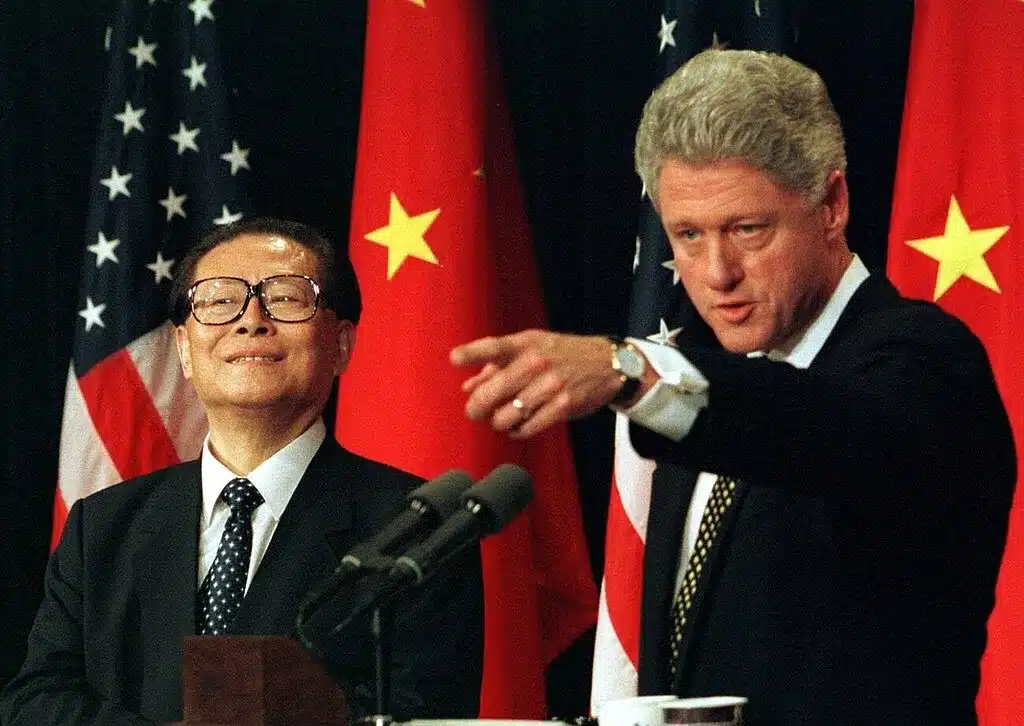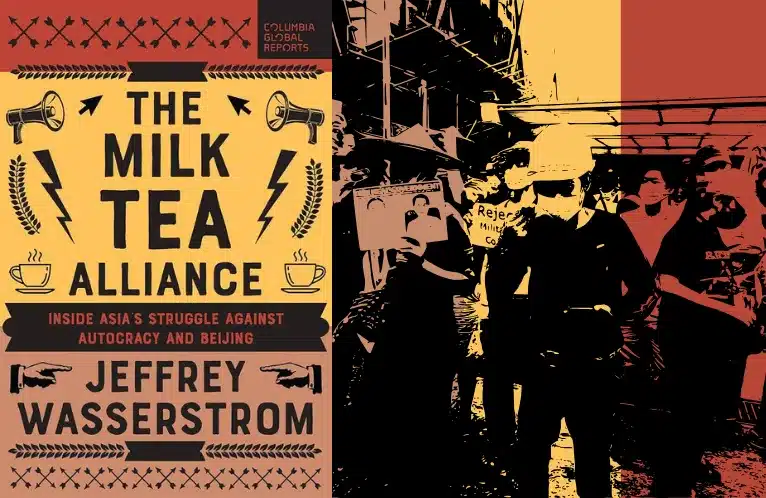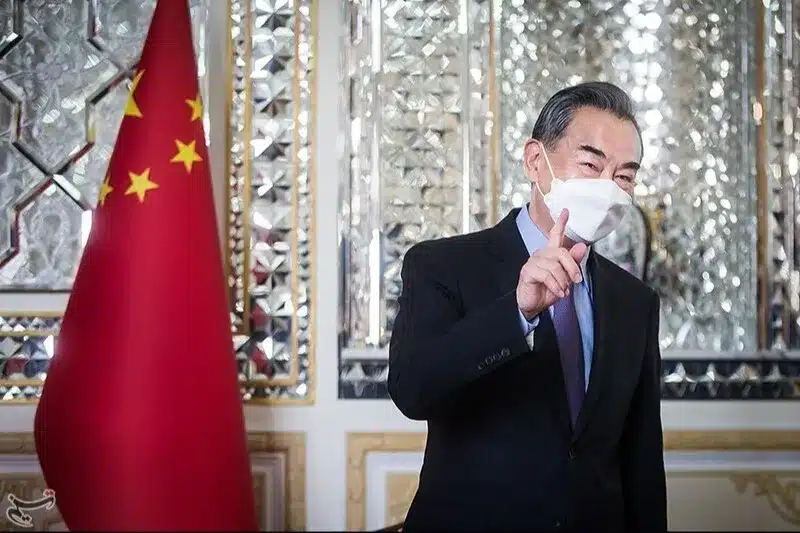Interview With Kerry Brown: Is The West Prepared to Accept China?
- Interviews
 Yawei Liu
Yawei Liu  Juan Zhang
Juan Zhang- 11/30/2023
- 0
In September, Kerry Brown, Professor of Chinese Studies and Director of Lau China Institute at King’s College, UK, published a new book about China entitled China Incorporated: The Politics of a World Where China is Number One. A central issue explored in this book is whether the West is ready to accept China’s place in the world and why allowing China to “be itself” is in the best interest of the West and the world.
At a time when China and the United States are fiercely debating the ultimate goal of “competition,” Brown’s new book provides the West with a unique window to review and possibly reset its relationship with China. Recently, the editors of U.S.-China Perception Monitor interviewed Brown for an in-depth discussion about his new book, the West’s obstacles to accepting China, and why the West should change its perception of dealing with China. In Brown’s view, coexistence will make the world much better than it is now.
Kerry Brown has previously written for the U.S.-China Perception Monitor. Find his analysis on Wang Huning here.
President Xi and President Biden held a highly anticipated summit in San Francisco. What is your take on the impact of this summit on the current U.S.-China relations? Were there any particular issues that you think the Summit missed?
In the current circumstances, when there have been so many tensions and arguments over the last few years, a meeting where there is a little display of common ground and at least some sense of pragmatism on both sides is welcome news. The worst situation is where the two sides simply don’t communicate.
To be honest, the U.S. has been more proactive under Biden than China has. Four U.S. high-level officials visited China earlier this year, including Janet Yellen, the Treasury Secretary, and Anthony Blinken, the Secretary of State. It was important that they did this. The Chinese side was distracted, I think, with their recently appointed Foreign Minister Qin Gang disappearing and then removed from office over the period from June onwards, and then their Defense Minister Li Shangfu also being removed in August. Perhaps now with Wang Yi back in the position he held till only recently, there is more stability and a return to normal.
I had very low expectations of the summit, and so the outcome to me was a positive one. The two key areas were to have military-to-military dialogue, which is critical, and to deepen work on the environment. It was also important to have Xi state so publicly that China did not seek hegemony and did not intend to use force to resolve its demands over Taiwan. These are longstanding positions, of course, but these days, what I most fear is surprises, and so when something is just reaffirmed, that at least provides a bit more of a sense of continuity and maintenance of the status quo.
You recently published a new book called China Incorporated: The Politics of a World Where China is Number One. The book’s title reminded us of the late Harvard professor Ezra Vogel’s Japan as Number One. Of course, Japan has never been able to become the number one. When you selected this book title, what was your rationale regarding China’s future standing on the world stage, especially during a time when there are many reports saying China’s economy is facing mounting challenges?
I think the key thing is not whether China ever would actually become number one, economically at least. I know that there are different ways of calculating this, and so some say that in terms of purchasing power parity, China is already there. However, in terms of the gross overall size of their economies, today, China is behind the U.S. and unlikely to catch up any time soon.
What I was more interested in doing was looking at the attitudes of the rest of the world if, hypothetically, China did manage to get to this sort of top slot. To me, one of the weird things in the last few years has been this rising sense of panic about even the possibility of China rising to that status. This is particularly mysterious because, of course, per capita, China is likely to remain a far poorer country than any Western one for a long time. I really was puzzled by why it was such a challenging issue for many people to see a world coming into being where the appearance of a wealthier, more prosperous China was such a difficult issue to them.
At the heart of this, I felt, lay the fact that one of the main reasons for tensions between China and the West today is as much from the lack of confidence by the West (by which I mean Europe, North America, and its alliances) in itself and its own systems in Europe and North America as it is worried about what China is and what it might do.
I remember in 2008, during the great financial crisis, speaking to someone in finance in the city of London, and how they said to me the UK should not fear Chinese companies coming and investing or operating in the UK because they would need to operate according to our rules and observe our regulations.
But today, I feel that confidence has vanished. There are people producing books that make very strong claims about how Chinese investment overseas is all directed by some nefarious intention to influence and change the outside world. Some of them claim that this has a strong political direction.
In my book, I try to think through the meaning of these claims. I found two particular issues. One was why the confidence we had in the West in the 2000s had gone, and the second was why we now felt so vulnerable and weak that Chinese investments were regarded not as economic or financial propositions, but as carrying something far deeper and more troubling. Where was the evidence for this?
I could understand any kind of investment, wherever it originated from, is self-interested, and looking to deliver benefit to the investor. But to go beyond this and claim that Chinese money has a much larger ambition seemed hard to take on board. That made me wonder whether the problem wasn’t so much what China was doing, but how those outside were responding. This was, after all, a two-way street, and to be forever focusing on one side of this was wrong.
Having observed, researched, and written about China for decades, could you please tell readers what you think makes China different from the West? Is this difference good for global peace and prosperity or should China overcome the difference and join Club West?
I think it is pretty clear today that the main issue Europeans have had with China for a long time (and this stretches back at least four hundred years or more to the time of the Early Enlightenment when Jesuits based in the Ming and Qing started to send back information about the place they were living in and its belief system) is simply its difference. What to make of a place where the fundamental philosophical ideals and world views had come from such a different tradition and evolved in such a different way – this was one of the key questions people in the past in Europe had to try to answer.
This was a neutral issue at the start. It wasn’t a case of embracing or condemning China but trying to make sense of it. Early observers were struck by the antiquity of Chinese civilization, but also the fact that it had a written tradition going back thousands of years. That was something unprecedented. Other places simply did not have this continuity.
Today, after so many decades and centuries of mutual engagement and influence in this history, I think we can appreciate that trying to change each other to become more aligned with our position has never really worked. We just have to find a place where we can accept each other as we are.
For Europeans, at least, I think this should be possible. We embrace pluralism in our values. We say we want diversity and a world where differences can co-exist peacefully. Maybe for Americans, it is a bit more difficult. I was struck when researching a history of Britain’s relations with China, which will come out next year, that for America, unlike Britain, there was much more of a role for the work of missionaries in China in the late Qing and a sense of great disappointment in the early 20th century that China did not covert in the ways expected. This reached its peak in 1949 when, of course, the very opposite of what the U.S. wanted, a Communist victory, occurred in China, despite all the efforts to bring about values change and have a more conducive government.
In the end, we need to make peace with these various aspirations and hopes about the other side not being the way we want them to be, and just accept them as they are. That is not easy. But it is realistic. And in my experience, realism usually works better in managing the world.
You support a multipolar world order where the West shares space with China, accepts China as it is, and works with China on some common challenges. The West seems to not quite be there yet on this issue. Why do you think this is the best scenario for the world? What are the obstacles for the West to accept China as it is?
I think the best scenario would be a world where the mindset of people changes, and they move beyond the binary situation they are often in at the moment, not least because that seems very restrictive. For decades, U.S. politicians like former Secretary of State Colin Powell or even the former British Foreign Secretary James Cleverley have said that we cannot encapsulate our relations with China in a single word or concept. It’s too complicated for that! And yet, in so much public discourse, we have this constant effort to talk in black and white options and to seek scenarios where it is all about good and bad, with no space for any option in between.
I remember sitting next to an American colleague at a think tank dinner in late 2019, and him saying to me, ‘Of course, Xi Jinping is evil.’ I really wondered after that conversation what meaning you could give to this description. How did it help to use a label like this? For sure, Chinese policy under Xi has posed plenty of issues. It has been assertive and, in some ways, removed a lot of the ambiguity that existed before in ways that we can find hard to manage. But dealing with this by using a term like `evil’ with all its moral condemnation and the Manichean belief system that it carries is a bit like using pre-Newtonian physics to describe quantum mechanics!
We need to think in a different way in this new world, and as Westerners at least, accept a new reality where not just Chinese but Indians and people elsewhere in the Global South are rising to levels of prosperity that mean that there has to be a different world order to accommodate these dramatic changes. Basically, at present, we have a pre-Newtonian diplomacy trying to manage a quantum situation! No wonder there is so much vexation.
While the West, especially the U.S., has a hard time getting along with China, you propose an amoral or pragmatic approach to deal with China. You basically say that the West should work with China to achieve something that is good for their own citizens, not focus on changing China. This argument made us think of the U.S.’s engagement policy with China. Critics of this policy point out that it has failed to change China for the good and, therefore, should abolish this policy and put decoupling/derisking into operation. What do you say to the naysayers of engagement policy?
We have to recognize that, in fact, China has changed profoundly over the last forty years. The engagement wasn’t a mistake. It has led to a transformed country. China today is different even from the place I visited and lived in for the first time in the mid-1990s. The one thing we can take as certain in all of this is the constancy of change!
Today, Xi Jinping’s China is posing problems. But as I argued before, those are often as much about the outside world and its propensity to panic and misunderstand things as it is about what China itself is doing.
Those who say engagement has failed to change China for the good are living in their own daydream. China managed to eradicate absolute poverty in 2020. The living standards of the vast majority of Chinese today are utterly different from those in the late 1970s. Chinese people have traveled in ways that were never dreamed of in the past. There are now almost 1 million Chinese studying abroad. In 2023, China will become the world’s largest exporter of cars! How can these changes be regarded as bad ones?
What people are saying is that China might have changed, but not in the way expected, at least politically. But for me, that is taking a short-term, parochial view. China has always been different, as I said above. It will always surprise. I am sure that in the future it will not lose that quality. Its political system will change and has to change – but it won’t happen in a way where it duplicates the outside world. There is a very simple reason for this. China is China! It is not Europe or America. It is seeking its own path.
As for decoupling, I can see that working in some areas, perhaps, but for the major challenges of our time, from global warming to AI to pandemics, decoupling won’t work. We have to work together. That is what is happening every day. So, for all the shrill, over dramatic and shouty claims in media and elsewhere about China and the U.S. delinking, to be honest, the future is likely to be one where they have to work harder together than ever before. It is a simple choice.
Either we collaborate and stand a chance of stopping extreme weather events, for instance, things that have already become apparent in 2023, or we tolerate those and carry on arguing with each other. I know which option I prefer. I just hope enough others agree to make that happen!
Speaking of decoupling/derisking, or “small yard and high fences,” how do you assess this approach to China since the Trump administration?
The Biden administration has tried to implement a hybrid approach to China, and I think with talk of decoupling and dual circulation, China has attempted to reciprocate. As of late 2023, however, with the Biden-Xi summit at APEC in San Francisco, it is pretty clear that there are limits to this approach.
I feel that an acknowledgment of that is now coming back into the relationship on both sides —— a sense that it is more harmful to cut themselves off from each other than to be working with each other because of the costs and risks this carries. Economically, the simple fact is that both are deeply embedded and integrated into each other. So, while it is sensible in some areas to have clear boundaries (high-tech, finance perhaps, semiconductors), in others, it would be against mutual self-interest to do so. We have to remember the Chinese middle class still offers a major market for the outside world, and their rising consumption is important for growth elsewhere. There are major opportunity costs in not being able to engage with this market.
When China is seen by the West as a source of almost all troubles in the world, what would you tell the young generation of students about Chinese culture, history, and the country at large? Is it worthwhile to invest their time in study?
I think students in the West need to copy their counterparts in China. I deal with Chinese students in the UK all the time. I am always amazed by their hard work, their ability to take on board different ideas, and to function in a very different environment to the one they are familiar with, but also to maintain a sense of their own identity and values.
It really is quite paradoxical. So many China critics in the West obsess over Confucius Institutes and how China is trying to infiltrate our institutions, etc. And yet, we have a huge number of people existing in our environment who seem perfectly comfortable with deep and sustained engagement with another culture without making them question their own sense of self and values.
Chinese students have huge versatility and can operate across different systems and beliefs and yet still know who they are. When we have the same kind of exposure by Westerners to China, then I think the world will be a better place. And those that at least go to China with an open mind and study, live, work, or just engage there at least can appreciate a more complicated reality afterward. And that sort of capacity is what we desperately need.
What can Europe, in general, and the UK, specifically do to help reduce tension between the U.S. and China?
To observe the words of Sun Tzu in The Art of War – we need to not just know our opponents, but also to know ourselves better.
China’s rise has raised questions about who we are and what we believe in. We have found this unsettling. But we can definitely handle this seismic change. My conviction is that the issue around China today is not its politics or its economic challenge. This is a global cultural revolution, the appearance for the first time in the modern era for the West of a power equal to them but with very different values.
That is a massive challenge, but it is a cultural one, not a political one. And we need to engage with this by understanding our own values and who we are. As people who embrace pluralism and diversity, there is a future where the existence of China, with all its differences and variations from others, is as much a good thing as a problem. If we can embrace that attitude, I think we can move to a better future.







